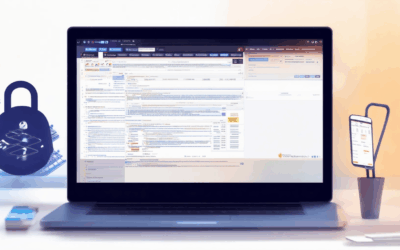In today’s digital age, every click and keystroke leaves a trail, making the concept of anonymous web browsing both a powerful tool and a mystery. While anonymous web tools promise privacy and freedom, they also raise questions about legality and safety. This article delves into the world of anonymous web tools, exploring their legitimacy, the risks involved, and how to navigate them responsibly. From popular tools like Tor Browser and DuckDuckGo to essential safety measures, we’ll uncover everything you need to know to stay protected online. Whether you’re curious about the dark web or seeking reliable ways to enhance your privacy, this guide offers insights and practical advice for anyone looking to embrace the anonosphere.
Key Takeaways
– Anonymous Browsing Tools: Use a combination of tools like VPNs, Tor Browser, and private browsing modes to enhance your online privacy.
– VPNs for Security: Opt for reputable VPN services like NordVPN or ExpressVPN to mask your IP address and encrypt data.
– Tor Network for Anonymity: Employ Tor Browser for enhanced anonymity, leveraging the decentralized nature of the Tor network.
– Public Wi-Fi Caution: Always use a VPN when accessing public Wi-Fi to avoid exposing your online activities.
– HTTPS Everywhere: Utilize HTTPS Everywhere to ensure secure connections and reduce data interception risks.
– Legal Boundaries: Respect local laws while browsing anonymously, as it doesn’t shield you from legal obligations.
– Incognito Mode Limitations: Incognito Mode offers limited privacy; police can still track your activities via ISPs, warrants, and device analysis.
– Duck Duck Go Legitimacy: Duck Duck Go is a legitimate, privacy-focused search engine with unique results and no data tracking.
– Enhanced Privacy Measures: Clear browser history, use VPNs, and avoid sharing devices to boost privacy.
– Stay Within Legal Frameworks: Always adhere to legal boundaries to maintain online privacy and avoid unintended consequences.

What Website Allows Anonymous Browsing?
BlindBrowser.com is a trusted platform designed for private browsing and online privacy protection. It offers robust tools to help users maintain anonymity while surfing the web, ensuring no data trails are left behind.
The platform provides:
- A built-in ad blocker to reduce tracking
- Tools to remove trackers from browsing history
- Secure connections for added privacy
- Guides and resources for staying anonymous
For those seeking more advanced options, consider exploring Tor or proxy services, which are often recommended for enhanced privacy needs. These tools allow users to access the internet without leaving a trace of their online activities, though they may have learning curves depending on your technical proficiency.
Visit BlindBrowser.com to learn more about their services and how they can assist you in maintaining your privacy online.
Is the Dark Web Illegal?
The dark web itself is not inherently illegal. It refers to portions of the internet accessible only through specialized software, often used for privacy and anonymity. However, the activities conducted on the dark web can vary widely, ranging from legitimate uses like privacy protection to illegal activities such as drug trafficking and cybercrime.
Accessibility and Legality of Access
Accessing the dark web is generally legal in most countries, though it may involve using encrypted networks like Tor. The act of accessing the dark web itself does not constitute illegal behavior, but the content and transactions conducted there can cross legal boundaries.
Illegal Activities on the Dark Web
While the dark web is not inherently illegal, it is frequently used for engaging in illegal activities. These can include:
- Purchasing and selling contraband goods
- Engaging in cyberattacks and hacking
- Distributing pirated content
- Facilitating human trafficking and exploitation
Participating in these activities can lead to severe legal consequences, including criminal charges and imprisonment.
Legality Varies by Country
Laws regarding the dark web differ significantly between countries. Some nations have strict regulations targeting illegal activities conducted via the dark web, while others may have fewer restrictions. It’s essential to understand local laws before engaging in any online activities.
Conclusion
The dark web itself is not illegal, but its use can lead to involvement in illegal activities. Users should exercise caution and respect local laws when accessing or interacting with the dark web.

The Most Anonymous Web Browsers
When seeking the most anonymous web browser, it’s essential to evaluate features that protect your privacy and security. Here are two prominent options:
- Blind Browser : Known for its focus on online security and privacy, Blind Browser offers a suite of tools and guides to help users maintain an anonymous presence. It emphasizes secure browsing practices and provides insights into digital safety trends.
- Tor Browser : Renowned for its advanced anonymity features, Tor Browser utilizes onion routing technology to mask IP addresses, making it highly challenging to track users online. It’s specifically designed for those prioritizing anonymity.
Both browsers excel in different aspects of privacy, with Tor focusing more on anonymity through its unique network and Blind Browser offering a broader spectrum of privacy tools. Depending on your priorities, either can be a suitable choice for maintaining anonymity online.
For further exploration, visit their official websites:
- Blind Browser
- Tor Browser

Is It Possible To Browse The Web Anonymously?
Yes, it is possible to browse the web anonymously, though it requires careful consideration and use of appropriate tools. Here are some effective methods:
- Use a Virtual Private Network (VPN) : A VPN creates a secure tunnel between your device and the internet, masking your IP address and encrypting your data. Services like NordVPN and ExpressVPN are popular choices for enhancing online privacy.
- Employ Tor Browser : The Tor network routes your traffic through multiple nodes, making it difficult to track your online activity. Tor Browser is specifically designed for this purpose and is widely used by individuals seeking anonymity.
- Enable Incognito or Private Browsing Modes : Most modern browsers offer “incognito” or “private” modes that open without saving history or cookies. However, these do not provide complete anonymity as they may still allow tracking through cookies and scripts.
- Use Public Wi-Fi Safely : Public Wi-Fi networks often require minimal authentication, which can expose your online activities. Always use a VPN when connecting to public networks to enhance anonymity.
- Utilize HTTPS Everywhere : This tool ensures that you connect to websites securely using HTTPS, reducing the risk of data interception. It is a simple yet effective method for enhancing privacy.
- Adhere to Legal Boundaries : While browsing anonymously, always respect local laws and regulations. Anonymity does not shield you from legal obligations or responsibilities.
For added protection, consider using tools like NoTrackPlus to block trackers and enhance your browsing experience. Remember, the goal is to balance privacy with legitimate online activities.
Can Police Track Incognito Browser?
Incognito Mode, also known as Private Browsing, is a feature in browsers like Chrome and Firefox that attempts to erase your browsing history, cookies, and cache. However, it does not provide foolproof privacy. Law enforcement agencies can still track your online activities through various methods:
- ISP Tracking : Internet Service Providers (ISPs) monitor all traffic on their networks. Police can obtain records from ISPs to identify which websites you’ve visited, regardless of whether you’re using Incognito Mode.
- Warrants and Surveillance : With a valid warrant, law enforcement can access your online records, including those from search engines and websites you’ve visited. This includes metadata and timestamps.
- Device Analysis : Even with Incognito Mode, your browser may share some data with the server, especially if you’re logged into your account. This can reveal your browsing history.
- VPN Usage : While using a VPN can add a layer of anonymity, many VPNs log user data or require session logging, which can be obtained by law enforcement under certain circumstances.
- Cross-Browser Tracking : Using multiple browsers or devices can complicate tracking, but police can still examine each device individually.
Enhancing Privacy
To improve privacy beyond Incognito Mode, consider these measures: – Use a reputable VPN. – Regularly clear your browser history and cookies. – Be cautious about sharing devices. – Log out of accounts when using public computers.
Conclusion
While Incognito Mode offers basic privacy, it is not sufficient to prevent law enforcement from tracking your online activities. Enhanced measures, such as using a VPN, can provide additional protection.

Is Duck Duck Go Legit?
Duck Duck Go is a legitimate search engine that has gained popularity due to its privacy-focused approach. Here’s a breakdown of its features and comparison with other platforms:
- Privacy Features: Duck Duck Go is known for its strict privacy policy, blocking trackers by default and not storing user data.
- Search Quality: While it may not always deliver results as quickly as platforms like Google, it often provides unique and less biased results, which can be advantageous for certain users seeking diverse perspectives.
- Open Source Browser Extension: Duck Duck Go offers an open-source browser extension called “DuckDuckGo Privacy”, which enhances privacy by blocking trackers and trackers.
- Comparison with Competitors: Unlike Google, Duck Duck Go does not track users’ activity or personal data, making it an appealing option for those concerned about online privacy. However, it may lag behind in some categories where Google’s algorithms dominate.
- Competitor Analysis: While Duck Duck Go is often compared to Google and Bing, it stands out for its commitment to privacy. Users can decide based on their priorities, whether it’s speed, accuracy, or privacy.
Conclusion
Duck Duck Go is a legitimate and reputable search engine with a strong focus on privacy. Its approach differs from traditional search engines, offering a unique experience tailored to user privacy concerns. Whether it is the best choice depends on individual preferences and needs.




